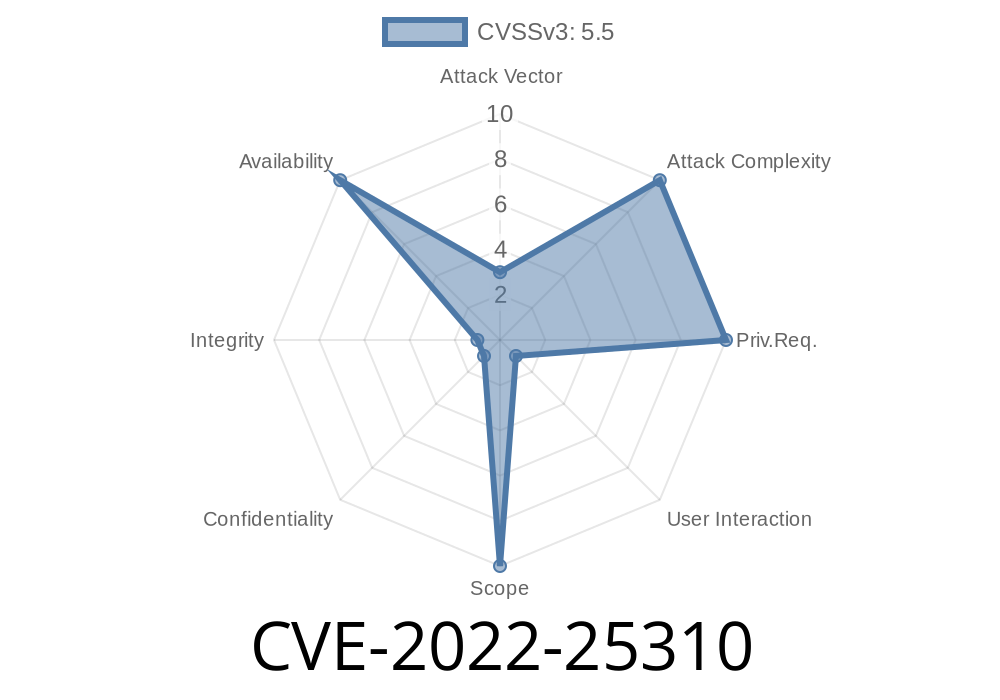If you work with software that deals with text rendering, you might have heard of Fribidi. It’s a widely used open-source library for handling bi-directional text (like Arabic or Hebrew mixed with English). But in February 2022, a security vulnerability was found that could cause programs using Fribidi to crash with just a specially crafted file. This post will break down what happened, why it matters, and what you can do about it — all in simple English.
What is CVE-2022-25310?
CVE-2022-25310 is the ID for a reported vulnerability in Fribidi. It affects the fribidi_remove_bidi_marks() function located in lib/fribidi.c. The flaw is a segmentation fault (SEGV), which basically means the program tries to access memory it should not touch. When this happens, the program will usually crash.
What’s the risk?
A remote attacker can craft a specific input file (for example, a text document) and trick Fribidi (or any app using it) into crashing. This is a denial of service (DoS) attack. While it’s not a direct path to stealing data or running code, the ability to reliably crash a service is bad news for stability.
Where Did the Bug Happen?
The problem was with how the fribidi_remove_bidi_marks() function handled its memory. The specifics involve not checking properly for the end of a potentially empty or malformed array.
You can see the vulnerable function here in the Fribidi GitHub repo (before the fix):
FriBidiStrIndex
fribidi_remove_bidi_marks (
FriBidiChar *str,
FriBidiStrIndex len)
{
FriBidiStrIndex i, j;
for (i = , j = ; i < len; i++)
if (!FRIBIDI_IS_BIDI_MARK(str[i]))
str[j++] = str[i];
return j;
}
The bug occurs when this function is called with a NULL pointer or the wrong length. For example:
If fribidi_remove_bidi_marks() is called with str == NULL and len > , the line FRIBIDI_IS_BIDI_MARK(str[i]) will instantly crash (SEGV) because it’s trying to access a NULL pointer.
Demonstrating the Vulnerability
A proof-of-concept (PoC) would simply call the vulnerable function with unsafe parameters. Here’s a minimal example in C to show how an attacker could exploit this flaw:
#include <stdio.h>
#include <fribidi.h>
int main() {
FriBidiChar *str = NULL; // This should point to valid memory
FriBidiStrIndex len = 4; // Nonzero length triggers the crash
// This will cause a segmentation fault!
fribidi_remove_bidi_marks(str, len);
return ;
}
On running this program, you will get a segmentation fault — the same as a possible remote attacker could trigger with malicious input in a real-world scenario.
How Would an Attacker Exploit This?
- Simple DoS: If an application uses fribidi to process user-submitted files, the attacker can upload a malformed file or string that causes fribidi to get a NULL pointer passed down to this function.
- Chaining: While this bug only leads to denial of service and not direct code execution, in some systems, repeated DoS on critical services could enable additional attacks, like crashing authentication or rendering services.
Which Fribidi Versions Are Vulnerable?
According to the upstream bug report and Red Hat advisory, Fribidi versions before 1..11 are vulnerable.
Is There a Fix?
Yes! Fribidi version 1..11 and later include proper checks to ensure that NULL pointers are not processed in fribidi_remove_bidi_marks(). Here’s a snippet showing the added check:
if (str == NULL || len <= ) {
return ;
}
This ensures that if the caller sends a bad pointer or an invalid length, the function just returns and does nothing — avoiding the crash.
Patch Now: Make sure you’re running Fribidi 1..11 or newer.
- Check Dependencies: If your program (like Pango, GTK, or a text processing tool) uses Fribidi, check their versions or ask your software vendors.
- Validate Input: Always double-check and validate input (for example, after reading files) before passing data to low-level C functions.
References & Further Reading
- CVE-2022-25310 on NVD
- Upstream patch commit
- Red Hat Security Advisory
- Debian Security Tracker
Final Thoughts
CVE-2022-25310 is a reminder that even tiny tools we take for granted, like text libraries, can be a security concern. The good news is, with prompt patches and a bit of care around input validation, you can keep your systems safe. If your applications process text files, especially from untrusted sources, review your Fribidi and dependencies today!
Have questions about patching this or other open-source vulnerabilities? Let us know in the comments!
Timeline
Published on: 09/06/2022 18:15:00 UTC
Last modified on: 09/09/2022 15:54:00 UTC
